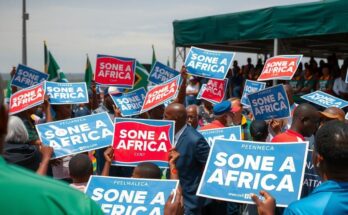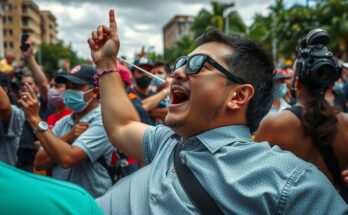Namibia is experiencing electoral chaos as voting for the presidential and parliamentary elections has been extended due to irregularities, including ballot shortages and malfunctioning equipment. The opposition IPC is urging citizens to vote while expressing concerns over the integrity of the process. The presidential race is particularly notable as it features Netumbo Nandi-Ndaitwah, who could become the first female leader of Namibia, in a political climate tense with youth frustration over economic conditions and governance.
Namibia is currently grappling with significant electoral turmoil following the extension of its presidential and parliamentary elections due to reported irregularities. The Electoral Commission of Namibia (ECN) acknowledged logistical failures, including insufficient ballot papers and malfunctioning electronic devices, which led to lengthy voting queues. As a result, polling stations will remain open until Saturday night—two days longer than originally planned.
Opposition parties, particularly the Independent Patriots for Change (IPC), are seeking to disrupt decades of governance by the ruling South West Africa People’s Organization (Swapo). Despite protesting against the extended voting period, IPC leaders, including presidential candidate Panduleni Itula, are encouraging voters to fulfill their civic duty amidst acknowledged voting issues.
Competing against Itula is Swapo’s vice president, Netumbo Nandi-Ndaitwah, who could potentially become the nation’s first female leader. However, her campaign faces headwinds from a disenchanted youth demographic, disillusioned with high inequality in a nation labeled upper-middle-income by the World Bank. This generation is increasingly questioning Swapo’s hegemony, drawing parallels with other Southern African liberation movements that have faced electoral backlash this year.
Namibia’s election complications occur alongside disturbances in Mozambique, where the ruling Frelimo party recently declared victory under accusations of electoral fraud, hinting at a broader trend of dissatisfaction towards long-standing political entities in the region.
Namibia, once a German colony and later administered by South Africa, attained independence in 1990, primarily through the efforts of the Swapo party, which has dominated its politics ever since. This dominance has resulted in significant social and economic issues, particularly inequality affecting the Black majority. As Namibia approaches its elections, the opposition seeks to leverage growing dissatisfaction among voters, particularly the youth, who feel marginalized in the current political landscape. Comparative regional struggles, such as those in Mozambique, further contextualize these electoral tensions.
In summary, Namibia’s electoral situation highlights the complexities of a nation divided by historical governance issues and modern socio-economic challenges. The call for a shift in power dynamics is palpable, marked by youth discontent and opposition efforts to challenge Swapo’s longstanding rule. As the situation unfolds, the outcomes of these elections may have implications beyond Namibia, reflecting a potential trend among formerly ruling liberation parties in the southern African region.
Original Source: www.aljazeera.com



